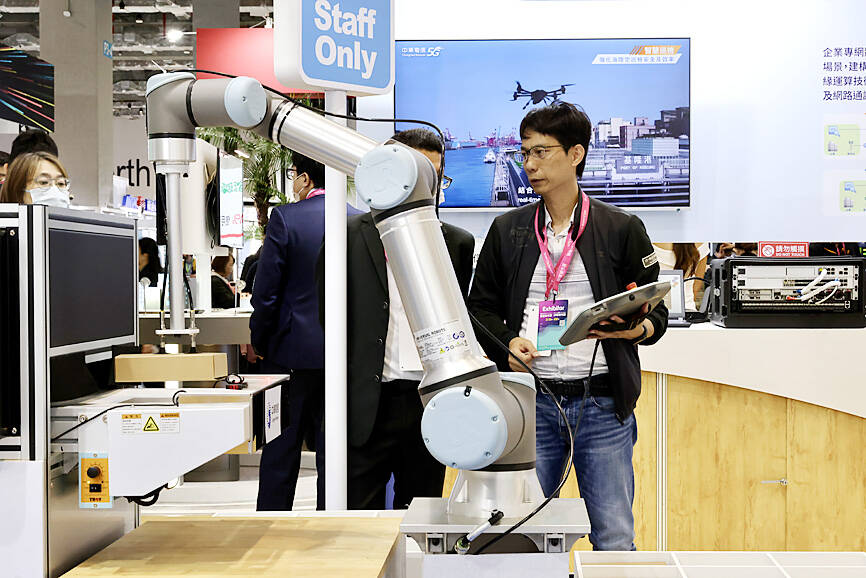The industrial production index dropped 1.1 percent year-on-year last month, as declines in traditional industries offset rising demand for artificial intelligence (AI) devices, servers, memory chips and flat-panel displays, the Ministry of Economic Affairs said yesterday.
Industrial production measures the change in the value of output produced by manufacturers, utilities and mines.
Last month, manufacturing output, which accounted for 95.39 percent of the industrial production index, dropped 1.2 percent annually, compared with the ministry’s projection of a decline 1.3 to 6.3 percent.

Photo: RITCHIE B. TONGO, EPA-EFE
“Manufacturing production was better than we expected last month as robust demand for emerging technologies mainly AI and high-performance computing (HPC) continued to drive demand for advanced chips,” Department of Statistics Deputy Director-General Huang Wei-jie (黃偉傑) said by telephone.
Commenting on reports that China has banned chips from Intel Corp and Advanced Micro Devices Inc in government PCs and servers, which could lead to order cutbacks on their chip supplier Taiwan Semiconductor Manufacturing Co (台積電), Huang said the impact remained to be seen.
This month, manufacturing output is expected to grow at an annual pace of between 1.5 and 6 percent, and grow between 5.3 and 6.9 percent annually this quarter, marking the first quarterly expansion since the third quarter of 2022, he said.
“The growth will continue over the remainder of the year, thanks to the improving global economic outlook driven by the resilient US economy,” benefiting Taiwanese manufacturers of chips, servers, electronic products and optical components, Huang said.
The production of electronic components, mainly semiconductors and displays, last month grew for a second consecutive month, up 9.8 percent annually, and expanded 10.11 percent during the first two months, as increased demand for AI and HPC devices, largely servers, boosted foundry companies’ 12-inch fab utilization, the ministry said.
The production of computers and optical components rose 3.86 percent annually last month, marking eight months of increases. In the first two months, computer and optical component production jumped 18.28 percent on the back of AI applications, cloud-computing services and camera lens upgrades, the ministry said.
Compared with the strong performance of the electronics industry, traditional industries were still struggling to emerge from a prolonged downturn.
The production of base metals, mostly steel, dropped 10 percent year-on-year last month, but expanded 3.78 percent during the first two months, thanks to inventory rebuilding demand and a lower comparison base, the ministry said.
The production of machine tools sank 10.41 percent last month, but increased 3.65 percent in the first two months also because of a lower comparison base.
The production of automotive products plummeted 19.48 percent last month but increased 8.82 percent in the first two months due to demand for electric vehicles and vehicle components.
The petrochemicals sector saw production decline 9.07 percent last month and drop 0.34 percent in the first two months as supply chain inventory remained high, the ministry said, adding that capacity expansion by foreign producers dampened demand for Taiwanese goods.

Real estate agent and property developer JSL Construction & Development Co (愛山林) led the average compensation rankings among companies listed on the Taiwan Stock Exchange (TWSE) last year, while contract chipmaker Taiwan Semiconductor Manufacturing Co (TSMC, 台積電) finished 14th. JSL Construction paid its employees total average compensation of NT$4.78 million (US$159,701), down 13.5 percent from a year earlier, but still ahead of the most profitable listed tech giants, including TSMC, TWSE data showed. Last year, the average compensation (which includes salary, overtime, bonuses and allowances) paid by TSMC rose 21.6 percent to reach about NT$3.33 million, lifting its ranking by 10 notches

SEASONAL WEAKNESS: The combined revenue of the top 10 foundries fell 5.4%, but rush orders and China’s subsidies partially offset slowing demand Taiwan Semiconductor Manufacturing Co (TSMC, 台積電) further solidified its dominance in the global wafer foundry business in the first quarter of this year, remaining far ahead of its closest rival, Samsung Electronics Co, TrendForce Corp (集邦科技) said yesterday. TSMC posted US$25.52 billion in sales in the January-to-March period, down 5 percent from the previous quarter, but its market share rose from 67.1 percent the previous quarter to 67.6 percent, TrendForce said in a report. While smartphone-related wafer shipments declined in the first quarter due to seasonal factors, solid demand for artificial intelligence (AI) and high-performance computing (HPC) devices and urgent TV-related orders

Prices of gasoline and diesel products at domestic fuel stations are this week to rise NT$0.2 and NT$0.3 per liter respectively, after international crude oil prices increased last week, CPC Corp, Taiwan (台灣中油) and Formosa Petrochemical Corp (台塑石化) said yesterday. International crude oil prices last week snapped a two-week losing streak as the geopolitical situation between Russia and Ukraine turned increasingly tense, CPC said in a statement. News that some oil production facilities in Alberta, Canada, were shut down due to wildfires and that US-Iran nuclear talks made no progress also helped push oil prices to a significant weekly gain, Formosa said

MINERAL DIPLOMACY: The Chinese commerce ministry said it approved applications for the export of rare earths in a move that could help ease US-China trade tensions Chinese Vice Premier He Lifeng (何立峰) is today to meet a US delegation for talks in the UK, Beijing announced on Saturday amid a fragile truce in the trade dispute between the two powers. He is to visit the UK from yesterday to Friday at the invitation of the British government, the Chinese Ministry of Foreign Affairs said in a statement. He and US representatives are to cochair the first meeting of the US-China economic and trade consultation mechanism, it said. US President Donald Trump on Friday announced that a new round of trade talks with China would start in London beginning today,